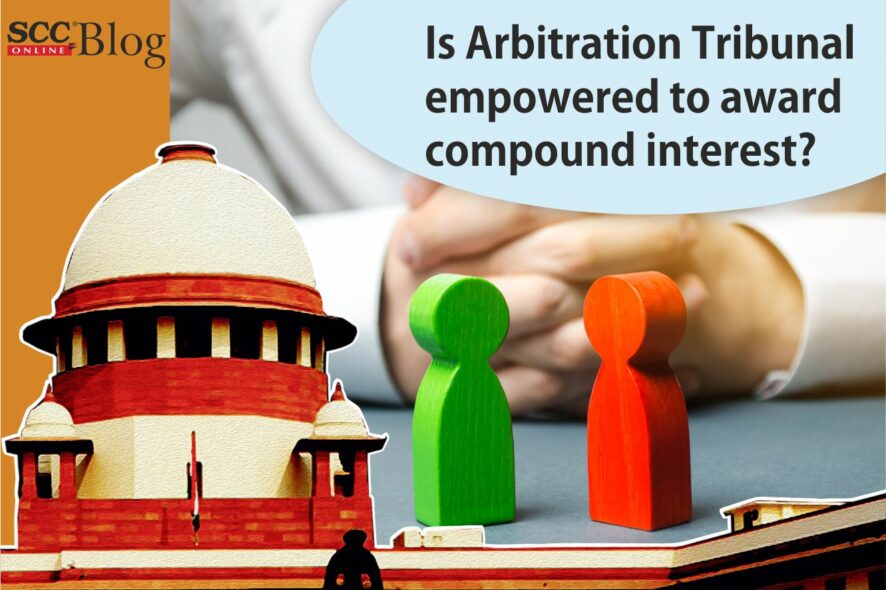Supreme Court: The 3-judge Bench comprising of N.V. Ramana, CJ., A.S. Bopanna and Hima Kohli*, JJ., held that Arbitral Tribunal is empowered to award interest on post award interest.
The instant appeal was filed by UHL Power Co. Ltd. against the order of the Himachal Pradesh High Court disallowing it pre-claim interest i.e., interest from the date when expenses were incurred, till the date of lodging the claim.
Background
Noticeably, the Sole Arbitrator had awarded a sum of Rs. 26,08,89,107.35p. in favour of UHL towards expenses claimed along with pre-claim interest capitalized annually, on the expenses so incurred. Further, compound interest was awarded at 9% per annum till the date of claim and in the event the awarded amount is not realized within a period of six months, future interest was awarded at 18% per annum on the principal claim with interest. However, in appeal under Section 34 of the Arbitration Act, 1996 the Single Judge had disallowed the entire claim of UHL.
The said judgment was challenged by UHL under Section 37 of the Arbitration Act and the Division Bench of the High Court had awarded a sum of Rs. 9,10,26,558.74 in favour of UHL, being the actual principal amount along with simple interest at 6% per annum from the date of filing of the claim, till the date of realization of the awarded amount.
Can interest be awarded on post-award interest?
For declining payment of compound interest awarded by the Sole Arbitrator to UHL, the Division Bench relied on the decision in State of Haryana v. S.L. Arora & Co., (2010) 3 SCC 690, to hold that in the absence of any provision for interest upon interest in the contract, the Arbitral Tribunals do not have the power to award interest upon interest, or compound interest, either for the pre-award period or for the post-award period.
Since the decision of S.L. Arora’s case had been overruled in Hyder Consulting (UK) Ltd. v. State of Orissa, (2015) 2 SCC 189, now, post-award interest can be granted by an Arbitrator on the interest amount awarded. Therefore, the Bench held that the findings returned in the impugned judgment to the effect that the Arbitral Tribunal is not empowered to grant compound interest or interest upon interest and only simple interest can be awarded in favour of UHL on the principal amount claimed, was quashed and set aside. Consequently, the findings of the Division Bench insofar as it related to grant of the interest component, were reversed and the arbitral award was restore on the above aspect in favour of UHL.
Whether Memorandum of Undertaking and Implementation Agreement were Separate Documents?
Rejecting the argument of the State that the Memorandum of Undertaking (MoU) did not merge into the Implementation Agreement, as both were distinct documents and that the MoU contained a separate Arbitration clause numbered as Clause 18, whereas the Implementation Agreement contained Clause 20, the Bench opined that a perusal of the recitals and the clauses contained in the Implementation Agreement belied such a submission, specifically, that the said MoU had been mentioned as “Appendix A” in the second recital of the Implementation Agreement.
Further, the same could be reinforced on a reading of the definition of the word “Agreement” as used in Clause 2.2 of the Implementation Agreement which clearly states that the word “Agreement” wherever used in the Implementation Agreement, shall include all its appendices and annexures and the MoU having been described by the parties as Appendix A to the Implementation Agreement, would have to be treated as having merged with the Implementation Agreement for all effects and purposes. Consequently, the Bench affirmed the findings of the Division Bench that the MoU had merged with the Implementation Agreement and, therefore,
“…the disputes that were referable to arbitration under the Implementation Agreement were to include disputes arising under the MoU, even though the latter document did contain a separate arbitration clause.”
Analysis and Conclusion
Rejecting the argument of the State that the Implementation Agreement had to be executed within a period of one year and since the provision for extension beyond one year was applicable only to the conditions contemplated in Clause 4.1(a) and (b) and not to those stipulated in Clause 4.1(c) to (g), the Bench said,
“When the parties to the Implementation Agreement were ad idem that the period of one year available to UHL to commence the construction activity was to be reckoned after the major requirements prescribed in Clause 4.1 could be obtained, then any argument sought to be advanced to segregate the obligations under different sub-heads of Clause 4.1 only to lay the blame at the door of UHL when the requisite clearances were to be obtained by the State Government from the Central Government and Centralized Authorities, is devoid of merits, besides being completely unreasonable and illogical.”
Upholding the view of the Division Bench that the Single Judge committed a gross error in re-appreciating the findings returned by the Arbitral Tribunal and taking an entirely different view as it was not open to the said Court to do so in proceedings under Section 34 of the Arbitration Act, by virtually acting as a Court of Appeal.
Consequently, the Bench restored the findings returned in the arbitral award to the effect that the State of Himachal Pradesh had proceeded to terminate the Implementation Agreement before expiry of the prescribed period which could have been extended up to 24 months, reckoned from the “effective date”, i.e. five months prior to the stipulated period by adopting a distorted interpretation of Clause 4 of the Implementation Agreement, which was impermissible.
In view of the above, the appeal preferred by UHL was partly allowed, while appeal filed by the State of Himachal Pradesh was rejected in toto.
[UHL Power Co. Ltd. v. State of Himachal Pradesh, 2022 SCC OnLine SC 19, decided on 07-01-2022]
*Judgment by: Justice Hima Kohli
Kamini Sharma, Editorial Assistant has put this report together







